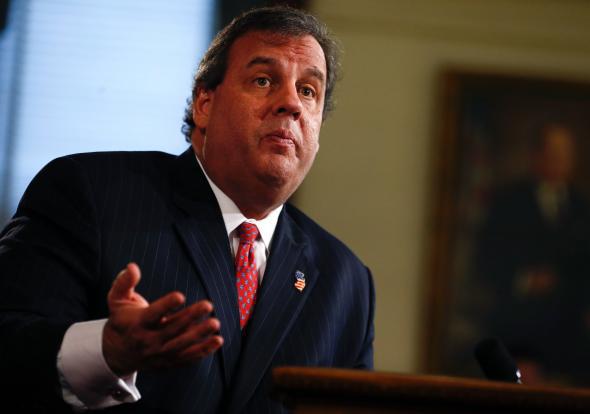Last week, after New Jersey Gov. Chris Christie gave a nearly two-hour-long press conference—during which he told reporters he was “embarrassed and humiliated” over the scandal that some are calling “bridgegate”—Benjamin Wallace-Wells wrote the following in New York magazine under the headline, “The Narcissistic Drama of Chris Christie’s Apology“:
“What does it make me ask about me?” the governor of New Jersey said about halfway through his press conference today, paraphrasing a reporter’s inquiry, and even though the event continued long afterward, this question seemed to contain its essence, and in some way the essence of Chris Christie too.
A few days later, in “The ‘I’ in Christie’s Storm,” Frank Bruni noted in the New York Times:
In his news conference on Thursday [Chris Christie] found a way to spell apology with a thousand I’s.
Note quite a thousand, more like 114. Nevertheless, is the self-referentiality of Gov. Christie’s apology really so atypical of the genre? Let’s consider some notable political apologies, which I’ve listed here in descending order of first-person-singular-pronoun (FPSP) percentage:
Larry Craig, Statement 6/27/2007: 558 words, 45 I’s (8.1%), 65 FPSP (11.6%)
John Edwards, Statement 8/8/2008: 358 words, 25 I’s (7.0 percent), 39 FPSP (10.9 percent)
James McGreevey, Resignation speech 8/13/2004:690 words, 32 I’s (4.6%), 68 FPSP (9.9%)
Eliot Spitzer, Apology to the public 3/10/2008: 184 words, 12 I’s (6.5%), 17 FPSP (9.2%)
Anthony Weiner, Confession 7/23/2013: 581 words, 30 I’s (5.2%), 49 FPSP (8.4%)
David Vitter, Press conference 7/16/2007: 388 words, 23 I’s (5.9%), 32 FPSP (8.2%)
Bill Clinton, Prayer Breakfast apology 9/11/1998: 1191 words, 52 I’s (4.4%), 96 FPSP (8.1%)
Chris Christie, Press conference 1/9/2014: 1982 words, 114 I’s (5.8%), 159 FPSP (8.0%)
Randy “Duke” Cunningham, Personal statement 6/23/2005: 1674 words, 69 I’s (4.1%), 117 FPSP (7.0%)
John Ensign, Farewell to the Senate, 5/2/2011: 2039 words, 96 I’s (4.7%), 148 FPSP (7.3%)
Mark Sanford, Press briefing 6/24/2009: 1689 words, 90 I’s (5.3%), 117 FPSP (6.9%)
Richard Nixon, “Checkers” speech 9/23/1952: 4613 words, 188 I’s (4.1%), 265 FPSP (5.7%)
As you can see, below in graphical form, Gov. Christie falls comfortably in the middle of the apologetic pack:
Did Wallace-Wells and Bruni, then, allow their opinion of Christie to cloud their judgment? If so, they’re not alone. In fact-checking George F. Will several years ago, I noted that Will accused President Obama of being “inordinately fond of the first-person singular pronoun,” with specific reference to a particular press conference. So I compared the actual count from that press conference with counts from comparable presidential press conferences of George W. Bush and William J. Clinton. Let’s add those points to the plot in question:
From this we can conclude two things: First, that political apologies are indeed more self-referential than the general run of political press conferences; and second, that George Will is singularly uninsightful. Regardless, he seems oddly committed to this particular false claim about Obama’s pronoun usage.
In fact, he later accused both Barack and Michelle Obama of “An Olympic Ego Trip,” in which they “gave heartfelt speeches about … themselves,” and even cited actual pronoun counts (but, notably, no comparison to similar speeches by others). In 2012, Will remarked, “If you struck from Barack Obama’s vocabulary the first-person singular pronoun, he would fall silent, which would be a mercy to us and a service to him, actually.” Here, then, is a list of first-person-singular pronouns from the presidential radio addresses on file at The American Presidency Project at the University of California, Santa Barbara:
| Words |
FPSPs |
Percent FPSP | |
| Reagan | 283,215 | 3,241 | 1.14% |
| Bush1 | 11,296 | 206 | 1.82% |
| Clinton | 374,140 | 3,805 | 1.02% |
| Bush2 | 254,379 | 2,684 | 1.06% |
| Obama | 123,893 | 1,123 | 0.91% |
Apart from his recent apology, Chris Christie has also been accused of talking about himself too much, specifically with respect to his speech at the Republican National Convention in 2012. To be sure, it was plausible to complain that he didn’t mention the national Republican ticket until about the 16:30 mark of his 24-minute address. But Andrew Rosenthal’s New York Times editorial at the time expressed this complaint in terms of a first-person-singular-pronoun count, despite the fact that Gov. Christie’s FPSP percentages were lower than those of the other featured speakers at the same event:
| All FPSP % | |
| Chris Christie | 2.17% |
| Paul Ryan | 2.22% |
| Rick Santorum | 2.23% |
| Ann Romney | 2.71% |
| Mike Huckabee | 2.89% |
| Clint Eastwood | 4.8% |
My point here is to caution against facile op-ed columns of the form, “I find X annoying and will therefore accuse him/her of talking about himself/herself too much, dressing this up in unsupported claims about rates of pronoun usage.” Careful empirical work on pronoun usage might well tell us something about the character of public figures (or of their speechwriters). But careful empirical work is not something that we can expect from most popular columnists, especially when the subject is language.
A version of this post originally appeared on Language Log.
